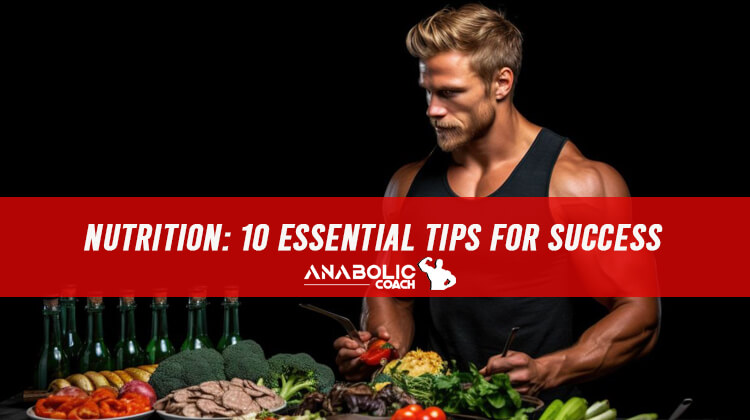Embarking on a fitness journey is more than just hitting the gym; it’s about embracing a comprehensive approach that includes proper nutrition.
In the quest to help you achieve your fitness goals, our seasoned fitness coaches have formulated ten indispensable tips to optimize your nutrition plan and boost your transformation in 2024 and beyond.
Tip #1: Strategic Caloric Adjustment
To effectively fuel your body for both training and recovery, it’s paramount to tailor your calorie intake to your activity level.
On active days, such as during intense workouts, your body demands extra nourishment to support muscle repair and growth.
Consequently, consider augmenting your calorie intake on these days while slightly scaling back on rest days. By harmonizing your nutrition with your training schedule, you will not only optimize performance, but also enhance recovery, laying the groundwork for sustainable progress.

Tip #2: Listen to Your Body
Nutritious food lists notwithstanding, it’s equally critical to heed your body’s responses to different types of foods.
Despite a food’s healthy reputation, your body might react unfavorably to it. Should you experience discomfort or adverse reactions post-consumption, it’s prudent to explore alternative options that better align with your body’s needs.
Tuning into your body’s innate signals enables the creation of a nutrition plan that nurtures both physical and emotional well-being.
Tip #3: Embrace Moderation
Striving for a healthier lifestyle doesn’t entail complete abstinence from indulgences. What is more important is to strike a balance between nutrient-rich choices and occasional treats to uphold both physical and mental satisfaction.
Instead of deeming certain foods off-limits, aim for moderation and variety in your dietary choices. Balancing occasional treats with nutrient-dense foods fosters sustained progress without feelings of deprivation or restriction.
Tip #4: Prioritize Protein Intake
Protein stands as a cornerstone in muscle repair, recovery, and growth, making it indispensable for those aiming to transform their physique.
Each meal should incorporate a source of high-quality protein, ranging from lean meats, poultry, and fish to eggs, dairy products, and plant-based alternatives.
Also, ensure that you are consuming enough protein to support muscle growth and repair. Aim for about 1.2 to 2.2 grams of protein per kilogram of body weight per day.
Not only does protein foster muscle synthesis and satiety, but it also regulates appetite, bolstering weight management endeavors.
Prioritizing protein intake facilitates optimal body composition and augments overall fitness results.

Tip #5: Balanced Macronutrients
Alongside protein, prioritize carbohydrates for energy and fats for hormone production and overall health. Balancing these macronutrients ensures sustained energy and optimal performance.
Contrary to popular belief, dietary fats are not adversaries; rather, they play a pivotal role in bolstering overall health and fitness. Healthy fats are abundant in avocados, nuts, seeds, olive oil, and fatty fish. These foods will rev up your daily essential nutrient requirements while also promoting satiety.
Furthermore, omega-3 fatty acids, prevalent in fatty fish and fish oil supplements, aid fat metabolism, mitigate inflammation, and enhance cardiovascular health.
Embracing a diverse array of healthy fats enriches your diet, fostering both flavor and satisfaction.
Tip #6: Gradual Caloric Reduction
While the allure of rapid calorie reduction looms large for expediting weight loss, it often backfires, precipitating feelings of deprivation and discontent.
Instead, adopt a gradual approach to caloric reduction by implementing small, sustainable changes to your diet and lifestyle.
Initiate by modestly reducing your calorie intake, such as by 200 calories per day, and monitor progress over time.
Simultaneously, elevate activity levels through regular exercise to establish a sustainable calorie deficit.
Gradual adjustments to diet and activity levels pave the way for enduring results devoid of compromise.
Tip #7: Hydration Is Key
Adequate hydration constitutes a linchpin of overall health and fitness, yet its significance often eludes many.
Water is pivotal to a myriad of physiological processes including metabolism, digestion, and the transportation of nutrients in the bloodstream.
On the other hand dehydration has an adverse effect on energy levels, cognitive function, and exercise performance, underscoring the importance of prioritizing fluid intake throughout the day.
Monitoring hydration status through urine color serves as a reliable gauge, with a pale yellow hue indicative of optimal hydration.
Opting for plain water or hydrating alternatives like herbal tea or infused water over dehydrating beverages, such as; caffeine or alcohol ensures sustained hydration levels, fortifying your fitness journey and maximizing results.
Tip #8: Timing Is Key
Eat frequent meals spaced evenly throughout the day to provide a steady stream of nutrients to fuel workouts, optimize performance, muscle growth, and recovery.
Here’s a breakdown of why timing is key when it comes to your nutrition and fitness goals:
Sustained Energy Levels
Eating regular, balanced meals helps maintain steady blood sugar levels, providing a consistent source of energy for workouts. This prevents energy crashes and sustains performance throughout the day.

Muscle Protein Synthesis
Consuming protein at regular intervals stimulates muscle protein synthesis (the process of building new muscle tissue) multiple times throughout the day. This promotes muscle repair and growth, especially when combined with resistance training.
Nutrient Delivery
By spacing meals evenly, you ensure a continuous supply of essential nutrients, including protein, carbohydrates, fats, vitamins, and minerals, to support muscle recovery and overall health.
Preventing Muscle Catabolism
Going too long without eating can lead to muscle breakdown (catabolism), as the body searches for alternative energy sources. Regular meals prevent this by providing a constant flow of nutrients, preserving muscle mass.
Optimal Recovery
Eating after a workout replenishes glycogen stores, repairs muscle tissue, and promotes recovery. Consuming a meal or snack containing both protein and carbohydrates within an hour after exercise maximizes these benefits.
It is worth noting that spacing meals evenly throughout the day ensures that your body is continuously fueled with the nutrients it needs to perform at its best, recover effectively, and support muscle growth and repair.
Tip #9. Supplement Wisely
Consider supplementing with creatine for improved strength and endurance, and branched-chain amino acids (BCAAs) to support muscle recovery and growth. However, always prioritize whole foods for your nutritional needs.
Tip #10: Get Quality sleep
Good quality sleep is vital for several reasons:
Muscle Recovery and Growth
During sleep, the body releases growth hormone, which is essential for muscle repair and growth. Adequate sleep allows your muscles to recover from intense workouts, repair damaged tissue, and grow stronger.

Hormone Regulation
Sleep plays a critical role in regulating hormones involved in metabolism, appetite control, and muscle building.
Insufficient sleep can disrupt hormone balance, leading to increased levels of cortisol (a stress hormone) and decreased levels of testosterone (a hormone important for muscle growth).
Energy Restoration
Sleep replenishes energy stores and allows your body to recover from the demands of training.
Waking up feeling well-rested and energized enables you to perform at your best during workouts and throughout the day.
Cognitive Function and Focus
Quality sleep enhances cognitive function, focus, and decision-making skills. This is important for staying motivated, adhering to your training program, and making smart nutritional choices to
support your fitness and bodybuilding goals.
Injury Prevention
Lack of sleep can impair coordination, reaction time, and muscle recovery, increasing the risk of injury during workouts.
Prioritizing good quality sleep helps reduce the likelihood of accidents and injuries that could derail your progress.
To optimize your sleep for fitness and bodybuilding success, you should:
Establish a Consistent Sleep Schedule
Go to bed and wake up at the same time every day, even on weekends, to regulate your body’s internal clock or circadian rhythm.
Create a Relaxing Bedtime Routine
Develop calming activities before bed, such as; reading, meditating, or taking a warm bath, to signal to your body that it’s time to wind down.
Create a Comfortable Sleep Environment
Make your bedroom conducive to sleep by keeping it cool, dark, and quiet. Invest in a comfortable mattress and pillows to promote restful sleep.
Limit Screen Time Before Bed
Reduce exposure to screens (e.g. smartphones, computers, TVs) at least an hour before bedtime, as the blue light emitted can interfere with melatonin production and disrupt sleep.
By prioritizing quality sleep, you will not only enhance your fitness and bodybuilding progress, but also improve your overall health and well-being.
In Conclusion
Realizing your fitness aspirations demands a holistic approach that encompasses both exercise and nutrition.
By integrating these ten essential tips into your nutrition regimen, you fortify your diet, amplify performance, and forge enduring results.
Whether your objective is muscle building, fat loss, or holistic health improvement, a well-rounded nutrition plan forms the bedrock of success.
Embrace these strategies, attune to your body’s cues, and remain steadfast on your path toward a healthier, fitter you.


